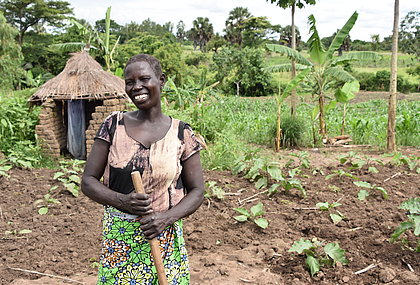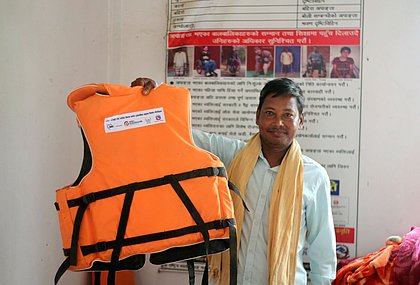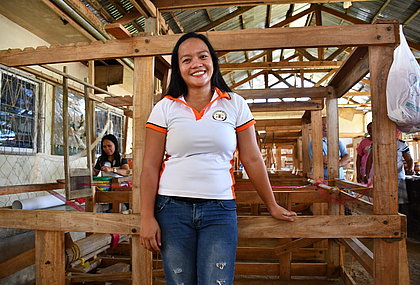The project area is located in the north-west of Uganda. The region is very dry and borders on Congo and South Sudan. Together with AFARD, we support smallholder families there, who live from their own agriculture but are affected by food insecurity for up to six months of the year.

"As part of our Climate Action Model Village project, we aim to make the target communities more resilient to climate change, economic and health crises. We also want to ensure that the people we work with, have income and food security,"
explains Sophie Prosper Yamutaro, the project coordinator at our partner AFARD. She and her project team set up fifteen so-called "Climate Smart Champion Groups". These are farmers' groups that organize themselves collectively, save money together and train themselves in sustainable agriculture and gender justice. The groups also create community and private "kitchen gardens" using innovative and climate-adapted land use techniques and improved seeds. All farmer groups also received 2 oxen teams with ploughs and carts for transporting the harvest. The oxen make working the fields much easier and more efficient. In the morning and evening, the animals can plough entire fields in a short time and the farmers have no longer to dig up the fields themselves in the heat.

"Climate change is affecting everyone in this region. The rainy seasons have changed, droughts have lengthened and harvests have been severely affected," reports Barbra Karungi, Project Manager at AWO International in Uganda:
"We are therefore preparing farmers* to have a clear harvest calendar, to plant early, to use resistant varieties to ensure that they can still do good business under the harsh conditions of climate change. At the same time, we also have the goal of protecting the environment".
One example of this is the switch to dry rice cultivation, as this releases significantly less methane and requires less water than wet rice. This relieves the environment and at the same time secures the food and income of the families. Ten villages in the districts of Nebbi and Pakwach are to become "climate-active model villages" in the course of the project by March 2026.
Projectinfo
| Project | Climate Action Model Village (CAM) Projekt |
|---|---|
| Place/Region | Uganda, West Nil Region, Distrikte Nebbi and Pakwach |
| Partner | Agency for Accelerated Urban Development (AFARD) |
| Target group | Vulnerable smallholder households, a total of 3190 beneficiaries |
| Activities |
|
| Duration | October 2022 – March 2026 |
| Budget | 931.400 EUR |
| Sponsor | BMZ Bengo, Aktion Deutschland Hilft (WDR Weihnachtskampagne) |



